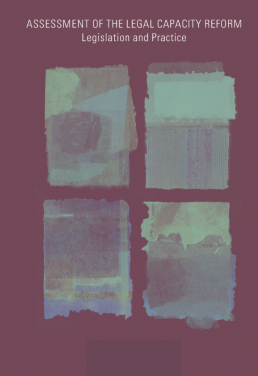საერთო ცხელი ხაზი +995 577 07 05 63


Number Of Pages: 172
Publication Year: 2020
Authors: Mariam JANIASHVILI, Nanan GOCHIASHVILI, Ketevan GIGINEISHVILI, Ketevan Filauri, Nino TABIDZE
The concept of legal capacity plays a key role in the human rights system.[1] Its unimpeded implementation is an invariable and necessary precondition for the enjoyment of a number of rights and freedoms.[2] The importance of this concept is further enhanced in relation to various vulnerable groups (e.g., persons with disabilities, women, migrants, and asylum seekers) who have historically had their legal capacity limited or deprived altogether.[3]
Despite the existing important international acts and standards in this field, full understanding and the implementation of the concept of the legal capacity of persons with disabilities remains to be a significant challenge. The right of the representatives of this group to equal recognition before the law and the ability to make decisions about their lives independently, both in Georgia and worldwide, is still substantially hindered. The UN Committee on the Rights of Persons with Disabilities (hereinafter - "Committee") has repeatedly stressed that most states have yet to understand the concept of legal capacity under a human rights-based approach.[4]
The support model in Georgia was established as a result of the decision of the Constitutional Court of Georgia in 2014,[5] which abolished the existing system of guardianship in the country and introduced a new - supported decision-making model. Although the reform is an important step forward in ensuring the exercise of legal capacity and is largely compatible with the principles enshrined in the UN Convention on the Rights of Persons with Disabilities, the content of some of the aspects of the legislation as well as the implementation of the reform remains to be problematic.
The purpose of this research is to assess the five-years experience of the implementation of the legal capacity reform in Georgia and to review the main challenges in legislation, as well as in the institutional framework and practice in this regard.
The document is divided into four main parts and practically repeat the stages of the supported decision-making system. The first part deals with the essence of the concept of supported decision-making and reviews its significance, the second chapter analyzes the stage of recognition of a person as a support receipient and dealth with both, the decision-making procedure by the court and the assessment of a person’s psychosocial needs. The third part reviews the support process in decision-making, while the fourth part analyses the oversight mechanism towards the support cases.
The research was prepared in the framework of the Project – “Promoting and Enabling Legal Capacity in Georgia”. The Project is funded by the Open Society Foundations (OSF) and is implemented by the following organizations – “Human Rights Education and Monitoring Center” (EMC), “Partnership for Human Rights” (PHR), Georgian Association of Social Workers” (GASW) and “Global Initiative on Psychiatry – Tbilisi” (GIP – Tbilisi).
The opinions expressed in the research are the sole responsibility of the authors and may not express the position of the Open Society Foundations (OSF).
[1] Committee on the Rights of Persons with Disabilities, General Comment No. 1 – Article 12: Equal recognition before the Law, CRPD/C/GC/1, 2014, para. 1.
[2] Full or partial restriction on exercise of legal capacity deprives persons with disabilities of the opportunity to exercise such rights as, for example, right to vote, right to marry, the reproductive rights, the right to give informed consent to medical interventions, etc; Committee on the Rights of Persons with Disabilities, General Comment No. 1 – Article 12: Equal recognition before the Law, CRPD/C/GC/1, 2014, para. 8.
[3] Report of the Special Rapporteur on the Rights of Persons with Disabilities, A/HRC/37/56, 2017, para. 15.
[4] Committee on the Rights of Persons with Disabilities, General Comment No. 1 – Article 12: Equal recognition before the Law, CRPD/C/GC/1, 2014, para. 3; Despite reforms in some countries, legal capacity is still somewhat limited by law or practice (e.g. the Czech Civil Code, which was reformed in 2014, still provides for certain restrictions on legal capacity; see, European Union Agency for Fundamental Rights, Implementing the United Nations Convention on Rights of Persons with Disabilities (CPPD), An Overview of Legal Reforms in EU Member States, 2015, p. 9).
[5] Decision of the Second Panel of the Constitutional Court of Georgia N 2/4 / 532,533 - "Citizens of Georgia - Irakli Kemoklidze and Davit Kharadze v. Parliament of Georgia", 2014.
The website accessibility instruction